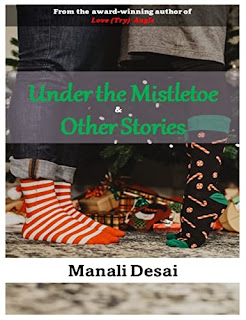Under the Mistletoe - Review
Book Review
Title:
Under the Mistletoe & Other Stories
Author: Manali Desai
Manali Desai’s stories have a
unique quality. They carry the salt tangs and sweet flavours of life
effortlessly. The sweet smiles of love mingle with the sobs of loss and grief
just like in life. There is longing and there is fulfilment too. Santa Claus is
always there somewhere in the background with his graciousness and twinkling
stars. Yes, these are Christmas stories. All twelve of them in this anthology.
There are six poems too, again with the Christmas carols echoing in the
background.
Writing
ultra-realistic stories which charm the reader delightfully requires a touch of
genius. That’s all the more true when the stories revolve round a particular
theme or season like Christmas. The author of this anthology possesses that
genius. She can bring a few very ordinary staff of an institution together in a
Christmas celebration and weave a fantastic romantic tale with an inimitable
twist at the end. A few passengers of a delayed flight can meet at an airport
and not only overcome their frustrations of not being able to celebrate the New
Year with family but also forge new friendly relationships that will last long.
Relationships
matter much to Manali Desai. There is plenty of them in her stories . There is a
lot of tenderness and Christmas is a fitting background to them. The title
story, ‘Under the Mistletoe,’ is a striking example of such tenderness. The one
which follows it, ‘Elfish Grinch,’ too carries such tenderness straight to
the reader’s heart.
Memories too
come and go with their versions of tenderness. ‘A Foggy Memory’ and ‘Alma
Matters’ come to mind instantly. Both of these take the protagonists back to
some fond childhood memories. But something more than remembering happens in
both.
The six poems
at the end of the collection too carry the Christmas flavour. I particularly
loved the boy who asks Santa for a gift with a difference: “Make me old enough
/ Or maybe / Convince my parents, / That I’m old enough, / To go out alone with
my friends, / To ask a girl out on a date…” And the PS to this poem made me
burst out laughing: “Not to be confused with Ithan, who is my friend.” The supplicant’s
name is Ethan.
The title ‘Under
the Mistletoe’ has a romantic touch. There is romance in most of the stories.
But more than that, there is the real human life in them. Life as it is lived
by ordinary people each day. Manali Desai has succeeded in adding poetry to
that life.
PS. The book
is available at Amazon.

Got to read this
ReplyDeleteGo ahead. All the best.
DeleteSeems like this would be bunch of enjoyable writing. I should read it as well.
ReplyDeleteSounds interesting, will give it a read. The way I see it, the word romance in the true sense is more about finding the beauty in everyday little things, experiences and relationships! Bollywood and Hollywood kind of messed it up!
ReplyDeleteInteresting review, will give it a read! The way I see it, the true essence of romance is the feeling of beauty and warmth in the everyday little experiences and relationships! Hollywood and Bollywood messed it up!
ReplyDelete